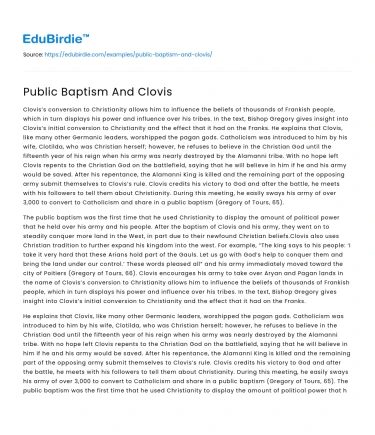Clovis’s conversion to Christianity allows him to influence the beliefs of thousands of Frankish people, which in turn displays his power and influence over his tribes. In the text, Bishop Gregory gives insight into Clovis’s initial conversion to Christianity and the effect that it had on the Franks. He explains that Clovis, like many other Germanic leaders, worshipped the pagan gods. Catholicism was introduced to him by his wife, Clotilda, who was Christian herself; however, he refuses to believe in the Christian God until the fifteenth year of his reign when his army was nearly destroyed by the Alamanni tribe. With no hope left Clovis repents to the Christian God on the battlefield, saying that he will believe in him if he and his army would be saved. After his repentance, the Alamanni King is killed and the remaining part of the opposing army submit themselves to Clovis’s rule. Clovis credits his victory to God and after the battle, he meets with his followers to tell them about Christianity. During this meeting, he easily sways his army of over 3,000 to convert to Catholicism and share in a public baptism (Gregory of Tours, 65).
The public baptism was the first time that he used Christianity to display the amount of political power that he held over his army and his people. After the baptism of Clovis and his army, they went on to steadily conquer more land in the West, in part due to their newfound Christian beliefs.Clovis also uses Christian tradition to further expand his kingdom into the west. For example, “The king says to his people: ‘I take it very hard that these Arians hold part of the Gauls. Let us go with God’s help to conquer them and bring the land under our control.’ These words pleased all” and his army immediately moved toward the city of Poitiers (Gregory of Tours, 66). Clovis encourages his army to take over Aryan and Pagan lands in the name of Clovis’s conversion to Christianity allows him to influence the beliefs of thousands of Frankish people, which in turn displays his power and influence over his tribes. In the text, Bishop Gregory gives insight into Clovis’s initial conversion to Christianity and the effect that it had on the Franks.
Save your time!
We can take care of your essay
- Proper editing and formatting
- Free revision, title page, and bibliography
- Flexible prices and money-back guarantee
He explains that Clovis, like many other Germanic leaders, worshipped the pagan gods. Catholicism was introduced to him by his wife, Clotilda, who was Christian herself; however, he refuses to believe in the Christian God until the fifteenth year of his reign when his army was nearly destroyed by the Alamanni tribe. With no hope left Clovis repents to the Christian God on the battlefield, saying that he will believe in him if he and his army would be saved. After his repentance, the Alamanni King is killed and the remaining part of the opposing army submit themselves to Clovis’s rule. Clovis credits his victory to God and after the battle, he meets with his followers to tell them about Christianity. During this meeting, he easily sways his army of over 3,000 to convert to Catholicism and share in a public baptism (Gregory of Tours, 65). The public baptism was the first time that he used Christianity to display the amount of political power that he held over his army and his people. After the baptism of Clovis and his army, they went on to steadily conquer more land in the West, in part due to their newfound Christian beliefs.
Clovis also uses Christian tradition to further expand his kingdom into the west. For example, “The king says to his people: ‘I take it very hard that these Arians hold part of the Gauls. Let us go with God’s help to conquer them and bring the land under our control.’ These words pleased all” and his army immediately moved toward the city of Poitiers (Gregory of Tours, 66). Clovis encourages his army to take over Aryan and Pagan lands in the name of spreading Catholicism. The idea that Clovis uses Christian beliefs as a tactic to expand his empire is also supported in the textbook, “A History of World Societies” by John McKay along with his colleagues. They explain that “Most historians today conclude that Clovis’s conversion to Christianity was a pragmatic choice: it brought him crucial support of the bishops of Gaul in his campaigns against tribes that were still Pagan (or Aryan)” (McKay, 189). With the help of Christian traditions, Clovis gains the support of his army and Gaulish religious leaders. This expansion stretches the Franks power further into the West.
Clovis’s use of Catholicism and its ideas also allowed him to gain the support of newly conquered peoples in the late Roman Empire. Unlike other Germanic tribes, who were pagan or supported Aryan Christianity, the Frankish adoption of Rome’s dominant religion made them favorable to not only Gaulish bishops, but also Roman people remaining in the West. Furthermore, Clovis gained more support by following Christian ideals. For example, Clovis tells his army that they are forbidden to steal or destroy any property of the people native to conquered lands (Gregory of Tours, 66). Through corresponding religious beliefs and use of Christian ideals, he becomes a virtuous leader for people living in Gaul before his conquest.






 Stuck on your essay?
Stuck on your essay?

